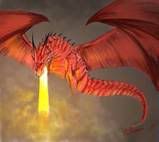them because their moods are so unpredictable.

In the Chinese history, the fire dragon is a very serious force to mess with. This is also reflected in individuals that undertake the behaviors of fire dragons. It is said in the Chinese culture that they are their own worst enemy. Of all the dragons in the Chinese literature, the fire dragon is among the most dangerous. Not only to other individuals and the surroundings but to their own self destruction.
In history and myths, it is the ability of a dragon to breath fire that can make it so mysterious and also so powerful. This is a way for it to ward of enemies and to protect itself. Quite a few people only hope for being powerful enough as being able to get their enemies to run for cover. That is why they may find they look up to the dragon and closely relate to it.
 There is no evidence to suggest that fire dragons, or any dragons for that matter, actually existed. They are believed as being an image that was developed in regards to snakes, dinosaurs, or even other smaller reptiles. Yet this concept of the fire dragon has remained to be passed along for centuries. It is more prevalent in some cultures than it is in others.
There is no evidence to suggest that fire dragons, or any dragons for that matter, actually existed. They are believed as being an image that was developed in regards to snakes, dinosaurs, or even other smaller reptiles. Yet this concept of the fire dragon has remained to be passed along for centuries. It is more prevalent in some cultures than it is in others.There is no shortage of books, artwork, and stories about fire dragons. Some of them portray them as mythical creatures that were very wise. In other aspects though the fire dragon is portrayed as something evil and to be feared.
No comments:
Post a Comment